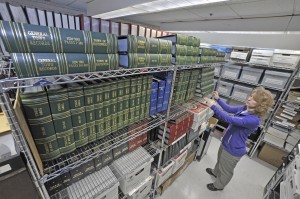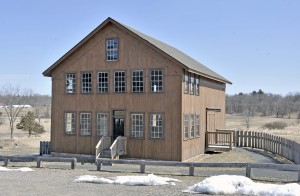
Southwick Town Clerk Michelle Hill, right, arranges a set of books that were recently returned to the Town of Southwick as part of an achieving and preservation program to save town documents. Hill said some of the documents date back to the early 1800’s. (Photo by Frederick Gore)
SOUTHWICK – A working session on the town’s Community Preservation Act expenditures was an eye-opener for some in attendance.
The meeting was held at Town Hall this week with members of the Board of Selectmen, Conservation Commission, Community Preservation Commission, Planning Board, Finance Committee, Cultural Council, Historic Commission, and more.
Conservation Coordinator Dennis Clark gave a presentation on the use of funds.
“We were pleased that the selectmen gave us the opportunity to bring the facts and figures of the CPA to light,” said Clark. “There has been a lot of misunderstanding and false information circulating around town. I was even surprised to see how much has been done with CPA funds, and how much the state has contributed to the town’s CPA projects. It is fair to say that none of these projects would have happened if the CPA was not in place.”

Funds from the town’s Community Preservation Act were used to create the Southwick History Museum on College Highway near the Moore House. (Photo by Frederick Gore)
Selectmen Chairman Russell Fox praised Clark and the Community Preservation Committee for its presentation.
“Dennis Clark did an excellent job giving out information about what we have accomplished with the CPA and new legislation that allows using CPA money for parks and recreational activities,” said Fox.
In Southwick, residents receive an additional tax to fund the CPA, which Fox said is three-percent of the value of property, minus the first $100,000.
“It is a little bit confusing,” Fox said of the funding formula. “But it is something Town Meeting voted on in 2004.”
Fox said when the state created the CPA, it gave every city and town the opportunity to take part in the program with the caveat that once a community voted to enter the program, it had to stay in it for five years.
Clark said in 2002, in his capacity as a Conservation Commissioner, he was called to the Brzoska Farm on Coes Hill / Hillside Road for a problem with beavers.
“When I observed how fantastic the farm was, Regina Grainy – one of the sisters – told me that they would like to preserve the farm and had applied for an Agricultural Preservation Restriction on the property,” said Clark. “When the town was asked to come up with the 10 percent share, $80,000, the town declined to participate with town funds.”
It was at that time Clark had heard about the Community Preservation Act.
“I was told that if the town passed the CPA the $80,000 dollars could be used, with the proper vote to match the state money of $720,000 that would total the $800,000 needed to purchase the APR for the farm, keeping it as a farm in perpetuity,” he said.
The Brzoska Farm was the first money spent from the newly adopted CPA. Since then, Southwick has been using CPA money for the town’s 10 percent match for seven more farms. None of these farms would have been preserved without it, Clark said.
“The Town Hall renovations, and document preservation would not have happened, along with other municipal projects that have been approved at Town Meeting,” Clark added.
There has been mention of eliminating the CPA to save money, which is why the board held its second CPA work session in the past year.
“We didn’t take any action because it was a work session, but we did feel that the information should be presented to the public,” Fox said.
If there is a desire to eliminate the program, or decrease the amount taxed for CPA, Fox said Town Meeting would have to vote on an article.
“If it passed then it would go to the election as a ballot question,” Fox said.
Fox added that it is his understanding that if the town decreased or eliminated the program, there is nothing that prohibits a future increase or entering the program again. Fox did not say he supported a decrease or elimination.
“I think we need to, as a community, look at the costs and have an open and frank discussion and if people feel we can’t afford this, they have to say that,” said Fox.
Fox had nothing but praise for the program and Southwick’s use of CPA funds.
“It is extraordinary what we have accomplished and how much acreage we’ve acquired and the historical things we have preserved,” Fox said. “I think Southwick is ahead of the curve – we’ve done some tremendous things.”

